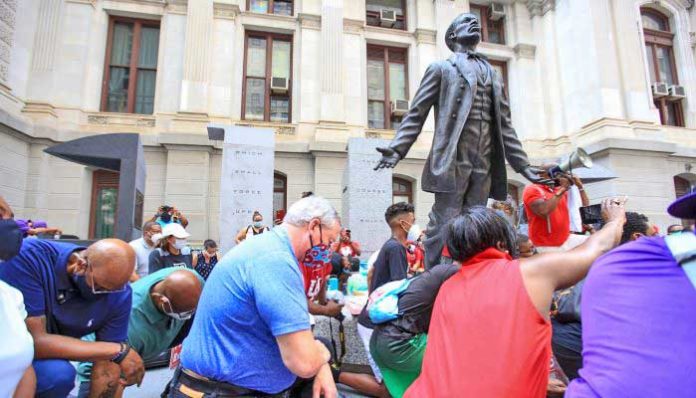Last week, amidst citywide protests, Mayor Jim Kenney announced that he has assembled a steering committee to address City reconciliation with Black, LGBTQ, and other marginalized communities. The administration has been consulting with members of marginalized communities at the local and state level, including LGBTQ community leaders and “diverse” members of the Police Reform Working Group.
“This has been a humbling experience for me and members of my administration,” said Kenney in a press release, “Many of us have realized that, as progressive and inclusive as we think we are, we still have a lot to learn. I am grateful to our colleagues throughout City government, especially the Black men and women, who called us out when we made mistakes, pushed us to do better, and urged us to act now.”
The City’s Office of LGBT Affairs penned an open letter to the LGBTQ community which states “unequivocally” that Black lives matter. Further, the letter reads: “As we stand in solidarity with the Black Lives Matter movement and demonstrations for racial justice here in Philadelphia and across the country, we understand that these calls to action represent the complex overlapping struggles of many marginalized identities — queer and trans and Black and Indigenous people of color and beyond.”
Kenney took the mayoral office in 2016. Since then, the administration cites that it has already taken measures to limit police power. These measures include a concerted effort to reduce pedestrian stops that lack reasonable suspicion, a halt to stop-and-frisks that are unconstitutional, a 50% reduction in officer-involved shootings, anti-bias and anti-racism training for officers, and the implementation of body cameras on officer uniforms.
Since meeting with the members of the Reconciliation Committee, the Kenney administration pledged to future actions to limit police authority and funding. These actions include adherence to President Obama’s pledge to review police use of force. Philadelphia Police Commissioner Danielle Outlaw will now require all use of force to be reported on the radio. Outlaw also banned the implementation of chokeholds and any sitting or kneeling upon a person’s neck, face or head.
While a $14-16 million increase was proposed, Kenney has vowed not to increase the police budget at all. The City will additionally create a Police Oversight Committee which will independently investigate civilian complaints. The City has also promised more transparency in Internal Affairs and the Police Advisory Committee. New positions will be created to implement and hold accountable just practices within law enforcement including a Deputy Inspector General to address abuse and the inclusion of an Equity Manager who will review and council on issues of prejudice and bigotry.
Yet, the continuing protests continue to highlight the fact that these measures haven’t been enough. The Black Philly Radical Collective (BPRC) published a series of demands. Of the demands, Kenney has satisfied part of the demand to defund the police. Kenney has only pledged not to increase the police budget, but did not address BRPC’s demand to decrease funding over the next five years until the police department is completely defunded. Kenney has additionally removed symbols of hate, bigotry, and racism such as the Rizzo statue and mural but the group has also called for the removal of the Wilson Goode street sign. Beyond that, Kenney has not reconciled any additional demands.
The BRPC demands an end to the “military occupation” of Black communities by ceasing any City involvement with the U.S. Department of Defense 1033 Program, which provides excess military equipment to state and local law enforcement agencies. “A local police force should not have the ability to engage with community members like enemy combatants,” said BRPC’s statement. Additionally, the group calls for the immediate and “swift” firing of any officer involved in an unjust killing. And, due to cited issues of nepotism, the BRPC demands the abolition of the Fraternal Order of Police and the Police Advisory Commission and replacement with a Community Control Board. “We will be focused on reconciliation, on understanding, and — most importantly — on engaging and taking appropriate action in response,” said Kenney in the press release, “We will embark on a path toward real change in Philadelphia, and hopefully across America. We will seize this moment, and we will move quickly because too many lives are being lost. This moment is a beginning.”
